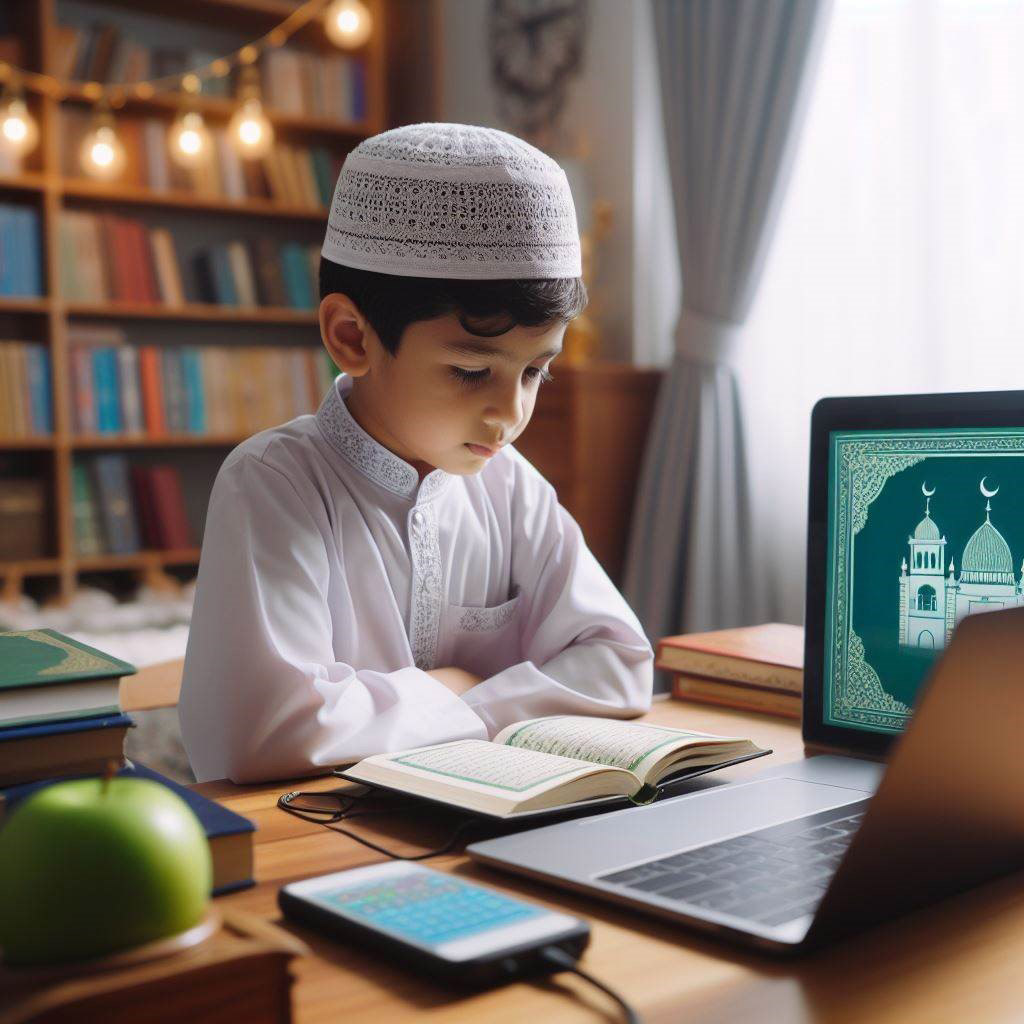You are all descended from Adam, and Adam was created from earth; in fact, the most honorable of you with Allah is the most Allah-fearing of you.
Prophet Muhammad (S)
Importance of Teaching the Grand Quran to Kids
Teaching the Sacred Quran to kids is a noble and essential endeavor for many families.
It is a way to instill values, morals, and a connection with their faith from a young age, fostering a strong foundation for their spiritual growth.
Overcoming Language Barriers
Visual Tools
Visual tools such as pictures, videos, and interactive apps can provide a visual representation of the concepts and teachings found in the Sacred Quran, making it easier for children to understand and engage with the text.
By complementing the verbal explanation with visual aids, parents can create a more immersive and interactive learning experience for their children, helping them to better comprehend and internalize the teachings of Quran.
One of the key benefits of using visual tools is that they can help bridge the gap between the language barrier and the child’s understanding.
For parents who are not fluent in Arabic, visual tools can serve as a universal language that transcends linguistic barriers, allowing children to grasp complex concepts and ideas without being hindered by language limitations.
By providing a visual representation of the Quranic texts, parents can make the teachings more accessible and relatable to their children, fostering a deeper connection and understanding of the message being conveyed.
Visual tools can also enhance the learning experience by making it more engaging and interactive for children.
By incorporating elements such as animations, games, and quizzes, parents can create a fun and dynamic environment that encourages active participation and retention of the material.
This not only makes the learning process more enjoyable for children but also helps to reinforce their understanding and memory of the Quranic teachings.
Furthermore, visual tools can cater to different learning styles and preferences, allowing parents to adapt their teaching methods to suit their children’s individual needs.
Some children may learn better through visual aids, while others may benefit more from auditory or kinesthetic methods.
By incorporating a variety of visual tools into their teaching approach, parents can cater to a range of learning styles and ensure that each child is able to effectively grasp and internalize the teachings of Quran.
Pronunciation Practice
Pronunciation practice plays a crucial role in learning any language, including Arabic.
For parents who are not native Arabic speakers, mastering the correct pronunciation of Arabic words and phrases can be challenging.
However, with dedication and practice, parents can improve their pronunciation skills and effectively teach their children Quran.
One of the key benefits of pronunciation practice is that it helps parents build confidence in their ability to speak Arabic.
By consistently practicing pronunciation, parents can overcome feelings of self-doubt and insecurity about their language skills.
This confidence is essential when teaching the Noble Quran to their children, as it allows parents to communicate the teachings and message of the holy book effectively.
Additionally, pronunciation practice helps parents develop a deeper understanding of the Arabic language.
By focusing on correct pronunciation, parents can hone their listening and speaking skills, which are essential for effective communication.
This deeper understanding of the language allows parents to convey the nuances and complexities of the Grand Quran to their children, ensuring a more meaningful learning experience.
Moreover, pronunciation practice can help parents connect with their cultural and religious roots.
For many families, the Heavenly Quran serves as a foundational text that shapes their beliefs and values. By improving their pronunciation skills and effectively teaching Quran to their children, parents can instill a sense of cultural and religious identity in their family.
This connection to their heritage can help children develop a strong sense of identity and belonging.
Storytelling in Arabic
Storytelling has been a long-standing tradition in Arab culture, dating back centuries.
It has been used as a powerful tool to convey morals, history, and religious teachings in a captivating and engaging manner.
Stories have the ability to transcend language barriers and connect with individuals on an emotional and spiritual level.
By utilizing storytelling in Arabic, parents who are not fluent in the language can still effectively teach their children about the Glorious Quran and its teachings.
One of the main benefits of storytelling is that it is not reliant on language alone.
Through the use of gestures, facial expressions, tone of voice, and body language, parents can effectively convey the essence of the story and its message to their children.
This is particularly important for parents who may struggle with speaking Arabic fluently but still want to instill their cultural and religious values in their children.
Additionally, storytelling allows for a more interactive and engaging learning experience.
Children are naturally drawn to stories, as they have the power to transport them to different worlds and capture their imagination.
By incorporating storytelling in Arabic, parents can create a dynamic and immersive environment for their children to learn about the Sacred Quran and its teachings.
This can help make the learning process more enjoyable and memorable for the children.
Furthermore, storytelling in Arabic can help bridge the generational and cultural gap between parents and children.
It allows for a shared experience where both parties can connect and bond over a common love for their heritage and religion.
Through storytelling, parents can pass down their knowledge and wisdom to the next generation, preserving their cultural identity and values for years to come.

Simplifying the Arabic Alphabet
Alphabet Charts
The Arabic alphabet is unique and beautiful, but it can also be challenging to learn for those who are not familiar with the language.
The alphabet consists of 28 letters, each with its own distinct shape and sound.
This can be overwhelming for parents who are not fluent in Arabic and may not know where to begin when teaching their children.
Alphabet charts provide a visual guide for parents and children to learn and understand the Arabic alphabet.
These charts typically display each letter of the alphabet along with its corresponding sound, making it easier for parents to help their children recognize and pronounce each letter correctly.
By using alphabet charts, parents can break down the Arabic alphabet into smaller, more manageable chunks, allowing their children to gradually build their knowledge and fluency in reading Arabic.
This can help alleviate some of the intimidation that comes with learning a new language, especially one as complex as Arabic.
In addition to simplifying the learning process, alphabet charts can also make learning fun and engaging for children.
By incorporating colorful illustrations and interactive activities, parents can create a learning environment that is both educational and enjoyable for their children.
Furthermore, using alphabet charts can help parents stay organized and track their children’s progress as they learn the Arabic alphabet.
Parents can use the charts to keep track of which letters their child has mastered and which ones they may need more practice with, allowing them to tailor their teaching approach accordingly.
Interactive Websites
DarulQuran Academy is an innovative online platform that aims to make learning the Arabic alphabet and Quranic knowledge easier for parents who are not fluent in Arabic.
The website offers a variety of interactive tools and resources that cater to children of all ages and learning levels.
From beginner to advanced courses, DarulQuran Academy provides a comprehensive curriculum that is specifically designed to simplify complex Arabic concepts for young learners.
One of the key features of DarulQuran Academy is its interactive lessons and activities that engage children in an enjoyable and effective way.
Through games, quizzes, and visual aids, children can learn the Arabic alphabet and basic Quranic teachings in a fun and interactive manner.
This hands-on approach not only makes learning more engaging but also helps children retain information better, leading to a more effective learning experience.
Moreover, parents can also benefit from DarulQuran Academy’s user-friendly interface and easy-to-follow instructions.
With step-by-step guides and tutorials, parents can navigate through the website with ease and assist their children in learning the Arabic alphabet and Quranic knowledge without feeling overwhelmed or confused.
This level of support and guidance is invaluable for parents who are not fluent in Arabic, as it provides them with the tools they need to effectively teach their children at home.
In addition to interactive lessons and user-friendly features, DarulQuran Academy also offers personalized learning plans and progress tracking for each child.
Parents can monitor their child’s progress and identify areas that need improvement, allowing them to tailor their teaching approach accordingly.
This level of customization ensures that each child receives a personalized learning experience that meets their individual needs and abilities.

Incorporating Interactive Learning Methods
Games and Quizzes
Games and quizzes are great tools for engaging children in the learning process.
They make learning fun and interactive, allowing children to actively participate and retain information more effectively.
By incorporating games and quizzes into their teaching, parents can make the learning experience more enjoyable for their kids, encouraging them to learn and engage with the material.
For parents who are not fluent in Arabic, games and quizzes can be particularly helpful in teaching the Pure Quran to their children.
These interactive learning methods provide a more visual and hands-on approach to learning, making it easier for kids to understand and remember the teachings of the Heavenly Quran.
By using games and quizzes, parents can break down complex concepts into smaller, more manageable chunks, making it easier for their children to grasp and retain the information.
Moreover, games and quizzes can also help parents track their children’s progress and identify areas where they may need additional help.
By incorporating quizzes into their teaching, parents can assess their children’s understanding of Quran and identify any areas where they may need to provide further guidance or support.
This can help parents tailor their teaching to their children’s individual needs, ensuring that they are able to effectively convey the teachings of the Grand Quran despite their own limitations in Arabic proficiency.
In addition to being effective teaching tools, games and quizzes can also help foster a love for learning in children.
By making the learning process fun and engaging, parents can instill a passion for exploring and understanding the teachings of Quran in their children.
This can help children develop a lifelong appreciation for Quran and its teachings, setting them on a path towards continued learning and spiritual growth.
Role Playing
One method that can be particularly effective for parents in this situation is role-playing. Role-playing is a form of interactive learning that allows participants to assume different personas and act out scenarios in order to gain a deeper understanding of a topic.
When used in the context of teaching the Heavenly Quran, role-playing can help parents engage their children in a fun and immersive way while also reinforcing key concepts and teachings from the text.
One way that parents can incorporate role-playing into their Quran lessons is by assigning roles to family members and acting out scenes from the text.
For example, parents could assign the roles of different prophets or characters from Quranic stories to different family members, and then act out key scenes from those stories together.
This can help children visualize and internalize the stories in a more concrete way, making them more likely to remember and understand the teachings of the Noble Quran.
Another way that role-playing can be used to teach the Grand Quran is by encouraging children to take on the role of a teacher themselves.
Parents can have their children lead discussions on Quranic topics or conduct their own research on specific verses, and then present their findings to the rest of the family as if they were teaching a lesson.
This not only helps children develop a deeper understanding of the material, but also builds their confidence and communication skills.
Role-playing can also be used to help children practice their Arabic language skills in the context of learning the Heavenly Quran.
Parents can create scenarios in which children must use Arabic vocabulary and phrases to communicate with one another, or play games that require children to translate Quranic verses from Arabic to their native language.
This can help children build their Arabic proficiency in a natural and engaging way, making the process of learning the Sacred Quran more enjoyable and rewarding for both parents and children.

Group Recitations
For many Muslim families, the teaching of the Grand Quran is an essential part of their child’s upbringing.
However, for parents who are not fluent in Arabic, this can pose a significant challenge.
One innovative solution that has been gaining popularity in recent years is group recitations as a way to incorporate interactive learning methods for parents who are not fluent in Arabic but want to teach Quran to their kids.
This approach not only benefits parents by providing them with the support they need to effectively teach their children, but it also creates a sense of community and solidarity among families who are all working towards a common goal.
Group recitations involve bringing together a group of parents and children to recite and study the Noble Quran together.
These sessions are typically led by a knowledgeable teacher or volunteer who can guide participants through the text and offer explanations as needed.
By reciting the Holy Quran in a group setting, parents are able to learn alongside their children and gain a deeper understanding of the text themselves.
One of the key benefits of group recitations is that they provide parents with the opportunity to interact with other families who are facing similar challenges.
This sense of community can be incredibly empowering and can help parents feel supported and motivated as they work towards teaching their children the Sacred Quran.
Additionally, group recitations can create a sense of accountability, as parents are more likely to stay committed to the practice when they know that others are relying on them to participate.
Another important aspect of group recitations is the interactive learning methods that are incorporated into the sessions.
By reciting the Heavenly Quran out loud, parents and children are able to engage with the text in a more meaningful way.
Group discussions and activities can also help to reinforce key concepts and foster a deeper understanding of the text.
Utilizing Online Resources and Apps
Virtual Tutors
Virtual tutors at DarulQuran offer a unique and effective way for students to learn the Grand Quran from the comfort of their own homes.
By leveraging technology, these tutors are able to connect with students in real-time, providing personalized instruction and guidance.
Through video calls, online messaging, and interactive study materials, students are able to engage with their tutors and ask questions in a convenient and efficient manner.
One of the key benefits of virtual tutors like those at DarulQuran is the flexibility and convenience they offer.
Students can schedule lessons at a time that works best for them, eliminating the need for travel or commuting to a physical location.
This flexibility is especially important for parents who may have busy schedules or live in remote areas where access to traditional learning centers is limited.
In addition to virtual tutoring, online resources and apps also play a significant role in helping parents who are not fluent in Arabic teach Quran to their children.
There are a wide variety of tools available online that cater to different learning styles and levels of proficiency.
From interactive games and quizzes to audio and video lessons, these resources provide parents with the support they need to effectively teach the Holy Quran to their kids.
For parents who may be new to teaching Quran or are not fluent in Arabic, it is important to create a structured learning plan for their children.
This can include setting goals, creating a schedule for studying, and utilizing a variety of resources to reinforce learning.
By leveraging online resources and apps, parents can supplement their own instruction with interactive and engaging materials that help their children learn and retain the information more effectively.

Islamic Learning Platforms
One of the best ways for parents to teach their children Quran is by utilizing online resources such as websites, e-books, and videos.
These platforms offer a wide range of materials in multiple languages, making it easier for parents who are not fluent in Arabic to teach their kids.
In addition to websites, there are also a number of educational apps available that cater to children’s learning needs.
Apps like Quran Explorer and Quran for Kids provide interactive lessons, games, and quizzes that make learning the Glorious Quran fun and engaging for kids.
These apps also offer audio recitations of the Noble Quran, making it easier for children to learn the correct pronunciation of Arabic words.
For parents who are not fluent in Arabic, it’s important to remember that teaching the Holy Quran to their kids is not solely about language proficiency.
It’s about instilling the values of Islam, such as kindness, compassion, and generosity, in their children. By focusing on these core values, parents can effectively teach their kids about the teachings of the Grand Quran and how to apply them in their daily lives.
Parents can also seek out local Islamic centers and mosques that offer classes and programs for children.
These institutions often provide structured learning environments where kids can learn about the Holy Quran and Islamic teachings from qualified teachers.
Additionally, parents can connect with other like-minded families in their community to form study groups or playdates where kids can learn together in a social setting.
In conclusion, while it may be challenging for parents who are not fluent in Arabic to teach the Quran to their kids, it is certainly possible with dedication, patience, and the right resources.
By investing in resources, setting a routine, focusing on understanding, seeking guidance, and leading by example, parents can effectively teach the Heavenly Quran to their children and help them develop a strong foundation in their faith.


